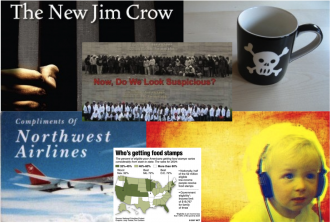 Verdict? What Verdict?
Verdict? What Verdict?
There’s no mistaking it: this week’s talk focused on the acquittal of George Zimmerman, the Floridian who killed teenager Trayvon Martin in February 2012. Below, you can find some of the week’s pieces about Martin, Zimmerman, and privilege here on The Society Pages, as well as a few other topics we hit on.
In the meantime, I’ve gotten two other suggestions of palate cleansing items to bring to your attention:
Sociologists: be sure to check out Scatterplot’s “Clusters of Sociology,” by Neal Caren. Grad board member Sarah Lageson writes: “[It’s] a network analysis of published sociology papers, looking at how the most cited articles cluster together over time, which ends up mapping on to what we think of as sociological subfields (i.e., crim, education, race, etc)… [a] cool application of network analysis [that] shows how really important pieces are central to subfields, as evidenced by the continual links to other important articles.”
Everyone: A fun piece from Steve Kraske in The Kansas City Star on the history of “Prairie Home Companion,” its upper midwestern cultural relevance, and why Lake Wobegone is “real.”
In Case You Missed It:
“Visualizing Punishment,” by Sarah Shannon and Chris Uggen. An actual look at disparities in imprisonment across states, over time and by race.
Special Feature:
“Wearing Privilege,” by Jennifer Lee. Speaking of privilege, a UC-Irvine sociologist reflects on knowing about the status privileges she carries (as non-black, highly educated, female, etc.) and feeling that privilege at work in the wake of Zimmerman’s acquittal.
Related: “Teaching Privilege to the Privileged.” Professors weigh in on courses meant to make white privilege visible even in an ostensibly “colorblind” age.
Office Hours:
“Michelle Alexander on The New Jim Crow,” with Kia Heise. Professor and civil rights lawyer Michelle Alexander shocked many when she claimed, in her 2011 book, that the racial dimensions of the American criminal justice system now constitute a reinvention (or continuation) of the pre-civil-rights era Jim Crow laws.
Citings & Sightings:
“Death Makes a Lively Topic,” by Evan Stewart. A Swiss sociologist’s sobering salons go worldwide.
“By Any Other Name,” by Erin Hoekstra. As soon as I hear on NPR that “yo” has become the gender neutral pronoun of choice among kids in Baltimore, we’re reading Dalton Conley writing in Vogue about his own kids, E and Yo, and why the Civil Rights Movement changed naming conventions in the U.S.
“Predicting Progress,” by Andrew Weibe. Is Mark Abdollahian Egypt’s Nostradamus? Using computer analysis to predict the outcome of social movements.
Teaching TSP:
“Documentaries on Race, Gender, and Sexuality in the Media,” grad student Kyle Green shares his favorite picks for movie day.
A Few from the Community Pages:
- Sociological Images. Over 17,000 Facebook “likes”? If you missed it, it’s time to go read “Stand Your Ground Increases Racial Bias in ‘Justifiable Homicide’ Trials.” See also: “Who Would You Shoot?” “‘I Am a Man,'” “Who’s Afraid of Young Black Men?” “The War on Blacks: Arrests for Marijuana Possession,” “Language and Trayvon Martin’s Life,” and much much more.
- Cyborgology. Is the “I Am Not Trayvon Martin” meme nothing more than widespread white guilt and self-congratulation? Black Bodies in the Justice System. Consumers, retailers, and tracking: camera 1, camera 2.
- Girl w/ Pen! Why child poverty is bad for democracy.
Scholars Strategy Network:
“If Immigration Reform Is Enacted, Will Newly Legalized Migrants Have Access to Federal Social Benefits?” by Cybelle Fox.

Comments